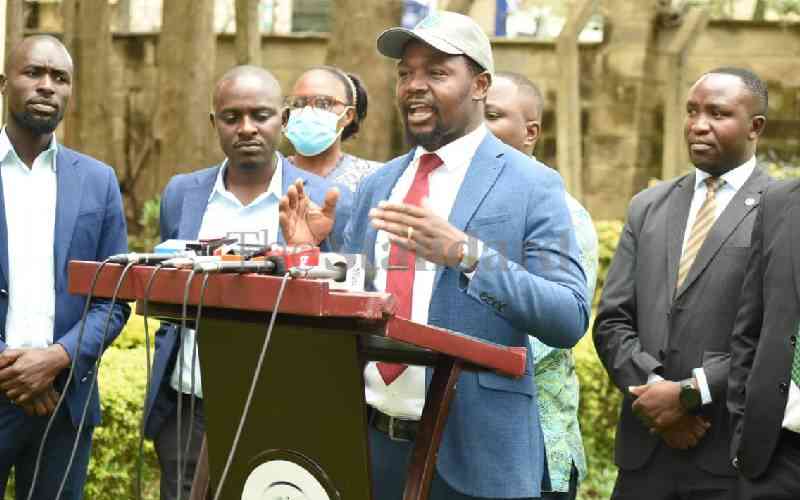
On January 30, the world assembled at various locations to commemorate the World Neglected Tropical Diseases (NTD) Day, which was first recognised on May 31, 2021 following the unanimous approval by WHO member states.
In the global fight against NTDs, this year places a renewed emphasis on the rallying call to “Unite. Act. Eliminate”. This overarching theme underscores the necessity for coordinated actions and collaboration to eliminate the burden of NTDs worldwide.
However, this ambitious goal can never be attained when the NTD family dares to walk alone.
The diseases represent a group of diverse infections that primarily afflict populations in tropical and subtropical regions, often in impoverished settings with limited access to health care. Globally, they impact over a billion people, with the majority residing in Africa, Asia and Latin America.
In the African context, including Kenya, NTDs affect millions of individuals, posing a significant public health challenge, often leading to severe morbidity, disability, and socioeconomic consequences.
While the WHO emphasises preventive measures, treatment programme, and increased access to health care, Kenya has implemented comprehensive national strategies aligned with global initiatives to address NTDs, involving preventive chemotherapy, disease management, enhanced surveillance, improved WASH (water, sanitation and hygiene) and community-based interventions.
Climate action and NTDs strategies Football enthusiasts understand the slogan ‘never walk alone’ which was adopted by Liverpool fans as a symbolic song in the fight for justice after the 1989 Hillsborough disaster in which 96 fans died. Equally, the NTD community is striving to fight the inequality caused by the diseases, which continue to pose significant preventable public health threats in the tropical regions of the world, causing approximately 200,000 reported annual deaths. However, the injustice from NTDs can only be addressed when the whole of society, which brings on board climate change actors, Public-Private Partnerships (PPPs), governments, and communities unite in the fight against NTDs.
The COP28 UAE declaration on climate and health, which built on the 1992 United Nations Framework Convention on Climate Change, emphasised the importance of taking urgent action in addressing the interactions between climate change and human health and wellbeing in the context of the Paris Agreement, as the primary international, intergovernmental fora for the global response to climate change can help realise this year’s theme.
- WHO, MoH launch training of healthcare workers in 4 counties ahead of El Nino
- Hope in fight against malaria as WHO approves another vaccine
- Diabetes: 'I had to find a new way to live'
- Respiratory infections: Dissecting the world's fourth cause of death
Keep Reading
NTDs are intricately linked to the climate change crisis, as shifts in temperature, precipitation patterns, and ecological conditions influence the distribution and prevalence of these diseases. Climatic factors, such as temperature, precipitation patterns, and extreme weather events, directly impact the life cycles of vectors and the survival of infectious agents, altering the geo-graphic range of NTDs. For instance, increased temperatures and changes in rainfall patterns can expand the habitats of disease vectors like mosquitoes and snails, contributing to the spread of diseases such as Lymphatic Filariasis, dengue and schistosomiasis. Additionally, extreme weather events can disrupt healthcare infrastructure, hinder disease control programmes, and exacerbate the vulnerability of affected communities.
In response to the intersection of NTDs and the climate change crisis, proposed actions involve integrating climate resilience into existing NTD control programmes.
This includes developing adaptive strategies that account for changing environmental conditions, enhancing surveillance and early warning systems, strengthening early warning systems for disease outbreaks, and promoting community-based interventions that enhance both health and environmental sustainability. Cross-sector collaboration is essential for addressing the intricate relationship between NTDs and climate change to ensure a comprehensive and sustainable strategy to mitigate the impact of both challenges on vulnerable populations. There is need to develop Kenya-specific interventions to address the intersection of climate change and NTDs, considering local environmental factors.
To adequately address NTDs in line with shifting climate change, the global strategy embraces precision public health as a foundational element. Leveraging advanced data analytics and technology for tailored interventions. This precision allows for targeted efforts in high-risk areas, optimising resources and accelerating the path to NTD elimination. By placing the affected individuals and communities at the heart of healthcare strategies, we can foster inclusivity, empower local populations, and strengthen the resilience of health systems against NTDs.
With limited resources to tackle NTDS, recognising the pivotal role of PPPs, the WHO 2020-2030 NTD strategy encourages collaborations between governments, private entities, and NGOs. This synergistic approach combines diverse resources, expertise, and innovations to enhance the effectiveness of NTD programmes.
To ensure sustainability, advocacy efforts need to be scaled for policy support and increased public investment by governments allocating sufficient funds to support research, prevention, treatment, and community engagement, ensuring a comprehensive and lasting impact.
Strategies should consider regional health disparities and focus on building resilience to address the specific health challenges posed by NTDs. Kenya is focusing on Primary Healthcare, guided by the 5Ps - Prevention, Promotion, Protection, Personalised care, and Participation. This approach will ensure NTDs interventions are tailored and integrated into the health system and reinforce the need for comprehensive and accessible healthcare services as well as address the root causes of these diseases.
The world, and Kenya especially, must unite in our commitment to act decisively, eliminating burden of NTDs. By addressing the intersection with climate change, embracing precision public health, fostering public-private partnerships, prioritising public investments, advocating for people-centered health systems and strengthening primary healthcare, we can truly eliminate the burden of NTDs and pave the way for a healthier, more resilient world.
The writer is Director for Population Health and Environment at Amref Health Africa
 The Standard Group Plc is a multi-media organization with investments in media platforms spanning newspaper print
operations, television, radio broadcasting, digital and online services. The Standard Group is recognized as a
leading multi-media house in Kenya with a key influence in matters of national and international interest.
The Standard Group Plc is a multi-media organization with investments in media platforms spanning newspaper print
operations, television, radio broadcasting, digital and online services. The Standard Group is recognized as a
leading multi-media house in Kenya with a key influence in matters of national and international interest.











